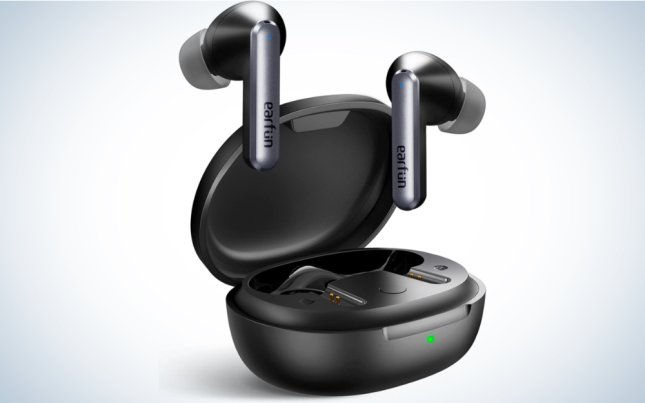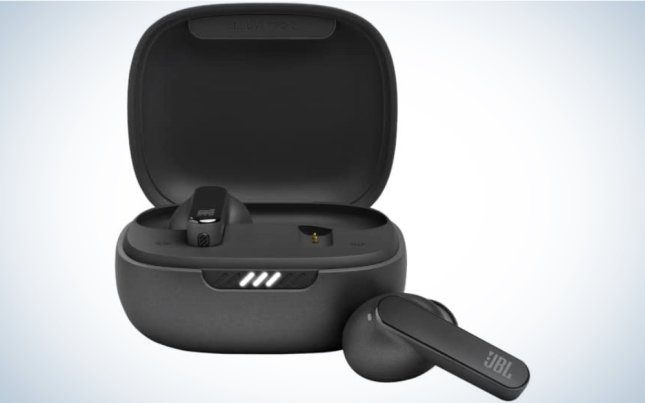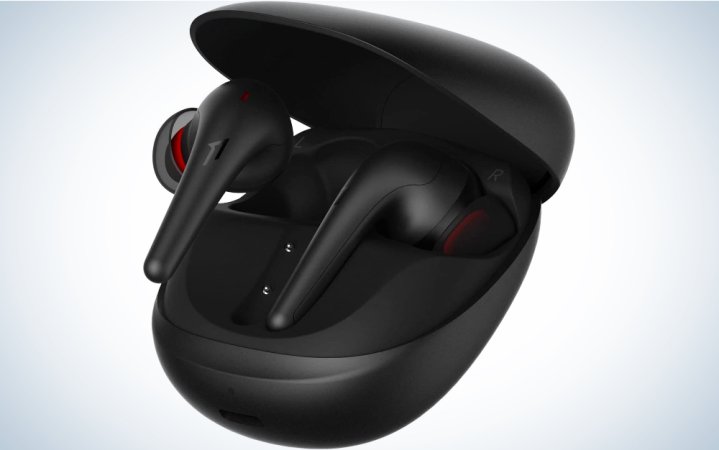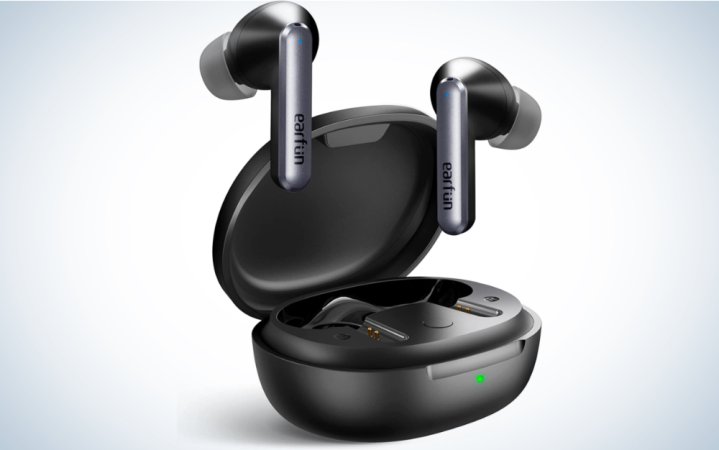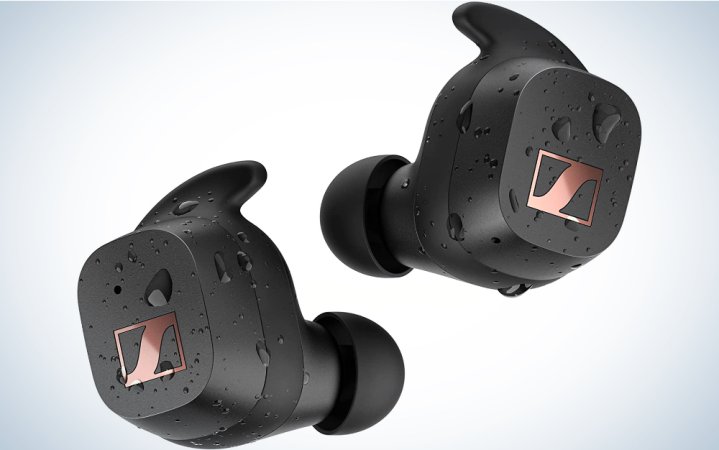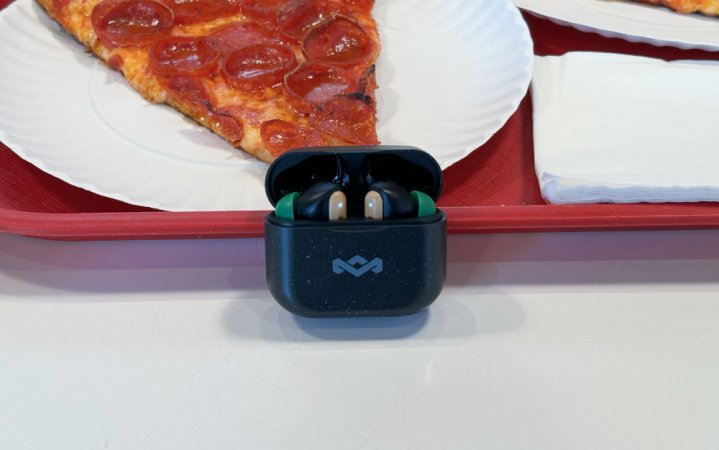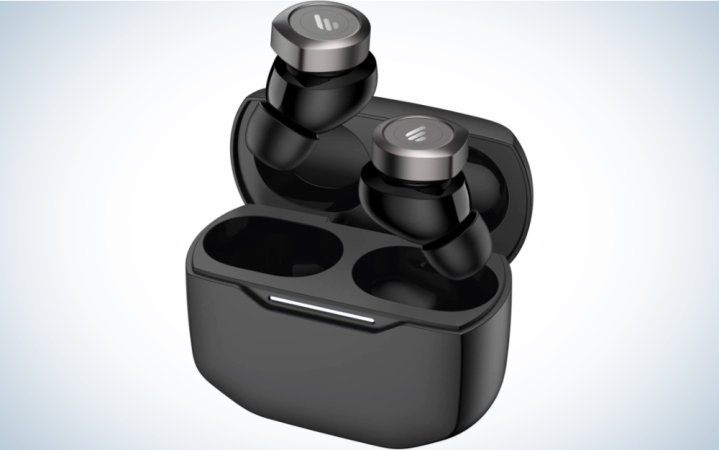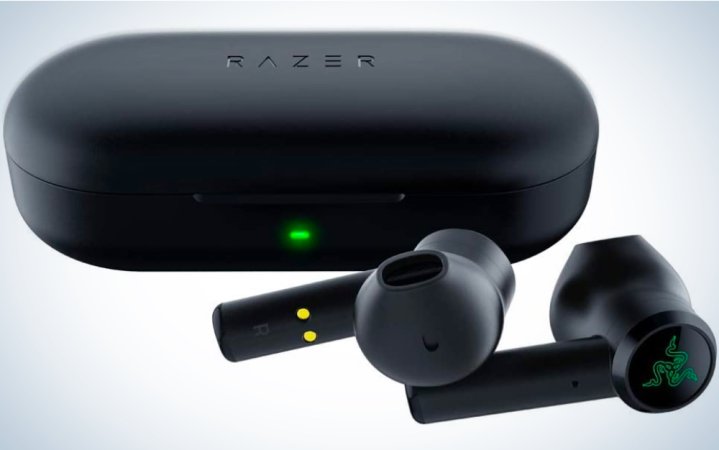We may earn revenue from the products available on this page and participate in affiliate programs. Learn more ›

The first cheap wireless headphones actually predated Bluetooth devices by decades. Invented in the 1960s, early wireless headphones used built-in AM/FM radio antennas to pick up audio wherever users went. But the popularization and proliferation of the low-energy short-range Bluetooth transmission protocol, beginning in the ’90s, really helped transform a novelty gadget into a nearly ubiquitous piece of audio equipment. And, thankfully, as technology ramps up prices are also able to come down. That means the best cheap wireless earbuds on the market can perform in ways audio engineers of yesteryear could hardly fathom.
Initially, Bluetooth technology allowed devices within close proximity to pair and “talk” with one another, though it was initially used for peripherals that could contain larger batteries. Slowly but surely compact yet higher-quality, more energy-efficient chipsets and signal encoding let the technology trickle down to the point that “wireless” earbuds didn’t need to be attached to any kind of receiver/transmitter. It’s how we got to true wireless (TWS): two independently powered and wirelessly connected earphones, what most people now think of when they hear “earbuds.” Apple’s AirPods quickly became the most well-known TWS earbuds, and the market just exploded. So whether you’re looking for some best budget-friendly workday wireless or an affordable pair that can undergo an intense workout, listen up: our selections for the best cheap wireless earbuds will pair you with the right pair to meet your needs.
- Best overall: 1MORE Aero Wireless Earbuds
- Best ANC on a budget: EarFun Air S
- Best for working out: Sennheiser Sport True Wireless
- Best sustainable: House of Marley Little Bird
- Best battery life: JBL Live Pro TWS 2
- Best for small ears: Edifier W240TN
- Best under $30: Skullcandy Dime 2
- Best for gaming: Razer Hammerhead True Wireless Earbuds
How we chose the best cheap wireless earbuds
When possible, we put earbuds through grueling workouts, hours of music and podcasts in different environments, and calls to friends to count how many times we have to ask, “Can you hear me now?” We toyed with controls to see if they are as user-friendly as they are purported to be. And when we couldn’t physically test something, we scoured critical consensus and user experiences and compared specs, looking at everything from battery life to bass quality to beamforming microphones. After all, our top priority is to help you make a sound decision.
The best cheap wireless earbuds: Reviews & Recommendations
By balancing all the factors discussed above, we’ve gathered the best cheap wireless earbuds that have a baseline of quality but have one feature that makes each pair stand out. Each award-winning earbud is complemented by alternatives in their category in case your needs or desired features vary a little bit. You may notice the same earbud manufacturers getting mentioned frequently throughout this story, and that’s by design. There are a lot of very bad cheap earbuds (heck, this applies to audio at all price ranges) but a handful of companies take budget audio very seriously. This shortlist includes relative newcomers—including Edifier, 1MORE, and EarFun—along legacy audio brands such as Sennheisser and JBL.
Best overall: 1MORE Aero Wireless Earbuds
1MORE Aero Wireless Earbuds
Why it made the cut: There’s no set of cheap earbuds that comes close to matching 1MORE’s latest earbuds feature for feature.
Specs
- Drivers: 10mm dynamic
- IP rating: IPX5
- Playtime: 7 hours ANC off/5 hours ANC on per charge
- Weight: 4.9 grams
Pros
- Active noise cancellation
- Spatial audio support
- Large drivers
Cons
- Price
1MORE’s technically impressive Aero Wireless Earbuds are only eligible for this guide because of a $20 Amazon coupon, and that is subject to change. We’re glad they could make the cut, however, and they’re not much more that our cutoff even at their full $109. At that price, actually at any price, their list of technical features is impressive, starting with their large 10mm (bigger is typically better in this case), which are complemented by 12 distinct EQ modes, which include the typical assortment of genre-based settings like “Acoustic,” “Classical,” and “Electronic.” The Aero Wireless Earbuds’ presets were developed by Sonarworks, a company that offers audio calibration software. You can also create your own custom EQ through 1MORE’s mobile app in case you’d like to twiddle the digital knobs to your taste.
Surprisingly, these sub-$100 earbuds support spatial audio, a headphones-style version of surround sound that allows you to hear tracks mixed in Dolby Atmos with a wider stereo stage. Gyroscopes inside each earbud will track your head movements, so the sound of the music will shift as you turn left and right. This is a neat effect found on Apple’s AirPods 3 and AirPods Pro 2, both of which cost a lot more than the Aero Wireless Earbuds. To take advantage of this feature, of course, you’ll need a subscription to a streaming service that offers spatial audio tracks, including Apple Music, TIDAL, and Amazon Music.
Spatial audio is impressive, but the processor inside the Aero Wireless Earbuds can do a lot more. The earbuds can adjust their sound based on your listening volume—again, this is a software feature developed by Sonarworks—to avoid distortion and optimize your listening experience. You get to decide which frequencies (bass, midrange, treble) are emphasized and deemphasized at your desired volume level through 1MORE’s app.
The Aero Wireless Earbuds have six microphones, which serve two purposes. The first is ensuring your call quality is excellent on the off chance you use your smartphone for its namesake feature, or, let’s face it, a Slack huddle or Zoom call. The second is active noise cancellation. 1MORE says the earbuds’ ANC analyzes the audio spectrum between 40 Hz and 4,000 Hz, and can reduce outside sounds by 42 decibels. Because it covers such a wide range, the earbuds can analyze sounds in your current location and zero in on specific noises it should be filtering out. The most common example of this is the whirring of a plane’s engines.
A downside to enabling ANC is that it cuts the Aero Wireless Earbuds’ battery life from seven hours to five. Compensating somewhat is the fact that the earbuds’ battery case can top them up an additional 15 to 21 hours (again, depending on your ANC settings), and that you can get three hours of music playback from a 15-minute charge. The battery case that comes with these earbuds supports wireless charging, too.
Finally, the Aero Wireless Earbuds have an IPX5 durability rating, so they won’t be damaged by sweat. This means you can use the earbuds for working out, though that’s not their primary intended purpose. This feature underscores the sheer versatility of these earbuds, which is their biggest strength. If you can get over the fact that they cost $100, pick up a pair immediately.
While the value of these earbuds blew us away, there are some worthy alternatives in their price range, or a little above if you can swing it. The AirPods 2, which have features like automatic instant pairing with Apple devices, are available for about $20 more and still make sense—even without ANC and with so-so battery life—if you stay within the company’s hardware ecosystem. The Soundcore by Anker A40 earbuds are true runners-up in this category, boasting double-layer diaphragm drivers, dynamic ANC, 10 hours of battery life, and LDAC support. If you’re an audiophile, these features make the A40s a no-brainer. 1MORE’s own ComfoBuds Mini earbuds are a solid pick, too, as they support many of the same features as the Aero Wireless earbuds (spatial audio being the biggest omission) in a smaller form factor.
Best ANC on a budget: EarFun Air S
EarFun’s Air S
Why it made the cut: EarFun’s Air S earbuds are an incredible value if noise cancellation is a must-have feature.
Specs
- Drivers: 10mm dynamic
- IP rating: IPX5
- Playtime: 6 hours ANC off/5 hours ANC on per charge
- Weight: N/A
Pros
- Active noise cancellation
- Low-latency game mode
- Large drivers
Cons
- Price
Active noise cancellation is a top-tier feature that used to be exclusively available in pairs that cost over $200. EarFun’s Air S earbuds are another stem-style pair that support it and only cost $62 currently, thanks to an Amazon coupon (price subject to change). Having your earbuds actively analyze and counteract environmental noise is non-negotiable if you plan on wearing earbuds on an airplane, during a noisy commute, or in a loud office, and it’s great for a couple of reasons. First, you can reduce the noises around you to a more manageable level without listening to any audio. If you need silence to focus, the Air S earbuds can help get you closer to that.
Second, the earbuds will allow you to listen to audio at a lower volume because you won’t have to crank up your music or podcast to drown out sounds in your environment. This can help prevent hearing loss in the long run while still letting you enjoy rich bass and clear highs. EarFun says these earbuds can eliminate up to 30 decibels of noise, which doesn’t match the performance of our top pick but is solid overall. The earbuds’ noise cancellation is complemented by an audio system featuring a 10mm wool-composite driver, and a Qualcomm chip that supports Bluetooth 5.2 with aptX for a higher-fidelity sound and handles both the earbuds tuning and active noise cancellation.
You can adjust the EQ of these earbuds through EarFun’s mobile app, with the option to choose between presets or create your own. The app is also where you can enable “game mode,” which reduces latency (lag) between your device and the earbuds and can make a difference if you’re playing an online title competitively. (Hearing footsteps a few milliseconds too late while playing a first-person shooter can give your opponents the advantage.)
EarFun touts the Air S four-microphone system, which it says can help deliver clear calls and enable ambient sound mode. Qualcomm’s cVc 8.0 tech is also a factor here since it’s responsible for processing the sound of your voice as you speak. These earbuds have a lot of power under the hood, but EarFun also focused on energy efficiency. The company says the Air S earbuds last up to five hours with active noise cancellation enabled. That’s only a half-hour less than Apple’s luxe AirPods Pro 2. Did we mention there’s also multipoint support? That’s a lot of value for a little money.
Another pair of good active noise-cancelling earbuds in this price range are TOZO’s NC2 IPX6 Bluetooth 5.2 earbuds, which can actually block a little more noise and get the same amount of battery life, according to their specs, but don’t feature Qualcomm’s processor and have smaller drivers.
Best for working out: Sennheiser Sport True Wireless
Sennheiser Sport True Wireless
Why it made the cut: Sennheiser’s Sport True Wireless Earbuds will stay in your ears without pinching them.
Specs
- Drivers: 7mm dynamic
- IP rating: IP54
- Playtime: 9 hours per charge
- Weight: 6.8 grams
Pros
- Svelte design
- High IP rating
- Adaptable acoustics
Cons
- No active noise cancellation
- Price
Let us be clear: Any of the earbuds in this guide would be suitable to wear while exercising, but Sennheiser’s are a notch above the rest because of their design. Most earbuds aimed at gym rats have extended hooks that wrap around the back of your ear to keep them in place as you run, jump, and lift. This design is functional but may chafe or otherwise irritate the back of your ear.
The Sport True Wireless Earbuds have fins that fit into the inside ridges of your ear, providing the same level of support without the added bulk and friction. The effectiveness of this design will depend on the shape of your inner ear but the earbuds come with multiple eartips, so you should be able to find one that fits properly. If so, you’ll have the benefit of traditional workout Bluetooth earbuds in a much smaller form factor.
The design of these earbuds is the primary reason we’re recommending them in this category, but it’s far from the only one. Their IP54 rating means they’ll be able to stand up to anything from sweat to exposure to rain without getting damaged. Additionally, they’re sealed tightly enough that dust shouldn’t damage them if you’re exercising outdoors and drop them on the dirt.
When you’re not working out, the Sport True Wireless Earbuds are still a solid pair for sheer music listening pleasure. Sennheiser allows you to adjust their EQ through a mobile app, and they get up to nine hours of listening time per charge. That extended battery life is possible because these earbuds don’t support active noise cancellation, which is a double-edged sword. On one hand, enabling ANC when exercising outdoors can be dangerous, since you may not hear cars or other people as they approach. On the other hand, the lack of ANC may bother you when you’re trying to listen to music during your commute or in an office.
Still, if you can get over the lack of ANC, and haven’t had luck with traditional workout earbuds, Sennheirer’s Sport True Wireless Earbuds may change your tune. Another factor to consider when considering the Sport True Wireless earbuds is their price. These are $100 earbuds, and while they’re certainly worth it, there are less expensive options out there if you’re on a stricter budget. If neither of these issues is a deal breaker, these earbuds deserve a spot in your gym badge.
If you like workout earbuds with ear hooks rather than fins, you should look at the Soundcore by Anker Sport X10s. The earbuds have an IPX7 rating (the highest on this list), and rotatable ear hooks that can help you get a more comfortable fit. You can customize their sound using Soundcore’s mobile app, too. Unfortunately, these earbuds don’t have ANC, but at least they’re $32 less expensive.
Skullcandy’s Push Active earbuds are another good choice at around the same price. They get 10 hours of battery life per charge and have an IP55 rating. Their most impressive technical feature is that their case has a Tile tracker built in, so you can find the earbuds more easily if they are lost. As you should expect, these earbuds don’t have active noise cancellation either.
If your preference is for stem-style earbuds and you want a pair you can take to the gym, on a run through the rain, or even in the pool (3 feet submersion for up to 30 minutes), the Treblab WX8 features IPX8 waterproofing and Bluetooth 5.1 to assure a stable connection for a soundtrack that’s as active as you are. For convenience and to get your adventure going ASAP, the earbuds have touch controls, while the case offers 5W wireless charging plus USB-C (the earbuds get 7 hours on a full charge, 28 hours total with a topped-off case).
Best sustainable: House of Marley Little Bird
Why it made the cut: House of Marley’s Little Bird True Wireless Earbuds punch way about their weight given their $40 price tag.
Specs
- Drivers: 10mm
- IP rating: IPX4
- Playtime: 6 hours
- Weight: 4.6 grams
Pros
- Well-balanced sound
- Excellent fit
- Price
Cons
- No ANC
One listen to House of Marley’s new Little Bird True Wireless Earbuds and we were convinced they shouldn’t cost $40. Their sound profile—sufficient bass, clear mids, crisp highs—was far too balanced, and their overall sound was far too detailed. Yet it was true, you can get these great-sounding earbuds for under $50. House of Marley focused on providing great sound at the expense of active noise cancellation, which is nowhere to be found on these earbuds.
This doesn’t mean the Little Bird earbuds are technically deficient. They support Bluetooth 5.3, are IPX4 water resistant, and come with interchangeable EQ settings via House of Marley’s iOS and Android app. The lack of ANC stings, but it’s lessened thanks to the earbuds perfect fit, which provides ample passive noise cancellation. I could still hear loud sounds (cars honking, the bass from a pizza joint’s sound system, loud screams), but softer ones were drowned out when listening to music.
Listening to the 2023 remixes of The Beatles’ “Red” and “Blue” compilations allowed me to run these earbuds through their paces. The distorted guitars of “Back In The U.S.S.R,” exuberant “Yeah Yeah Yeahs” on “She Loves You” and pounding piano on “Hey Bulldog” were all present. Even the psychedelic sound effects on “Tomorrow Never Knows” were intact and as creepy as ever. Because these earbuds were released in 2023 and tuned for todays music, it was also easy to appreciate any track from Olivia Rodrego’s “Guts” and Bad Bunny’s “nadie sabe lo que va a pasar mañana.”
The overall value of the Little Bird earbuds cannot be overstated, even if they occasionally flaked out when we listened to music while walking through a busy intersection and don’t support ANC. We hope House of Marley adds this feature to the second-generation version of these wireless earbuds, because they’d be an excellent contender for the best earbuds under $100.
Best battery life: JBL Live Pro TWS 2
JBL Live Pro TWS 2
Why it made the cut: JBL’s Live Pro TWS 2 Earbuds will outlast your desire to play music in one sitting.
Specs
- Drivers: 11mm
- IP rating: IPX5
- Playtime: 10 hours
- Weight: 4.6 grams
Pros
- Large drivers
- Oval-shaped ear tips
- Six microphone array
Cons
- No active noise cancellation
- Price
There are some circumstances when you need a pair of earbuds that can reliably get you through an entire day of music listening without conking out. JBL’s Live Pro TWS 2s are those earbuds. They offer a whopping 10 hours of music playback per charge, and their battery case can fully recharge them three times. If you manage to run down the Live Pro TWS 2s before you’re done listening, a 15-minute rest in their case will top them up enough for four hours of listening.
This astounding battery life is only possible because the Live Pro TWS 2 earbuds don’t support active noise cancellation, which is their only technical downside. Beyond that, these are a solid pair of earbuds. They have the largest drivers of any earbuds we’re recommending, at 11mm, and JBL designed the earbuds to be oval rather than circular to create a better seal around your ear.
Choosing this shape improves the earbuds’ bass response and passive noise cancellation by increasing the surface area and the odds of getting a perfect seal around your ear. That’s the perfect combo: a driver that pushes more air and an earbud that doesn’t let all that energy escape. It will also help them stay in your ear while exercising, which is a feature that pairs nicely with the earbuds’ IPX5 rating. You can tune the way the earbuds sound through JBL’s app if you find the bass overpowering or want to find the best balance for your favorite music. JBL touts the Live Pro TWS 2’s tuning, which is derived from the company’s long history in live music reinforcement, so you may not need to touch any dials.
The Live Pro TWS 2’s second most impressive feature is a six-microphone array, which all but ensures you’ll sound excellent on phone calls. The microphones support a feature called beamforming, which means they’re designed to pick up sounds coming from your mouth while you’re talking rather than picking up a lot of ambient sounds like the wind. This microphone hardware will also be helpful if you want to access your phone’s voice assistant to ask questions or control your music hands-free.
It may be a similar refrain at this point, but the Live Pro TWS 2’s price tag is relatively high. Still, considering the earbuds’ longevity we feel it’s perfectly justified. If you’re someone who needs a long-lasting pair of earbuds for casual listening or to block softer sounds like typing while in an office, pick these up.
The best alternative is Sennheiser’s CX True Wireless Earbuds, which offer nine hours of battery life per charge and currently clock in at around $80. Their battery case can only recharge them twice, for a total of 27 hours, which can’t quite stand up to the 40 hours offered by JBL’s earbuds. Still, we wouldn’t count out the sound of Sennheiser’s earbuds, and their smaller form factor may be more appealing to you than the long stalks found on the Live Pro TWS 2.
If you can give up another hour of battery life and are on an even tighter budget, JBL’s 230NC TWS earbuds are a good choice for $70. They support active noise cancellation, and their battery case offers an extra 24 hours of juice for a total of 32 hours. You give up two microphones and a little durability, but there’s no denying that the 230NCs are a good value in this category.
Best for small ears: Edifier W240TN
Edifier W240TN
Why it made the cut: Edifier’s W240TN may be small, but that hasn’t compromised their battery life or other technical features.
Specs
- Drivers: 10mm dynamic + 6mm dynamic
- IP rating: IP55
- Playtime: 7 hours ANC on/8.5 hours ANC off per charge
- Weight: 5.3g
Pros
- Dual-driver audio system
- Active noise cancellation
- AI noise reduction
Cons
- Physical button controls
Let’s face it: many true wireless earbuds have taken their design cues from AirPods, but their large stalks may not feel comfortable to wear if you have smaller ears. Enter Edifier’s W240TNs. The earbuds are physically smaller than our other recommendations, though ironically, they’re the second heaviest and the only pair to have a dual-driver audio system. Unsurprisingly, those two specs are related.
The benefit to having a dual-driver audio system is that—because drivers are being dedicated to specific frequency bands, say one for treble and the other for mids/bass—you should be able to hear sounds more clearly. This type of audio hardware is more effective on a speaker, which has more space to physically separate the drivers, but it can still work in miniature with a good crossover implementation and acoustic chamber, and we’re impressed by Edifier’s decision to bring the same concept to earbuds. The W240TN’s audio hardware goes hand-in-hand with its customizable EQ, which allows you to put those drivers to work.
You might assume that their small size translates to worse battery life, but you’d be wrong. They last between seven and eight hours depending on whether you have active noise cancellation enabled, which is on par with the other ANC earbuds we could find in this (or any) price range. This energy efficiency is especially impressive from earbuds that cost $64—a relative bargain compared to our top picks in the other categories of this guide.
We’re especially impressed by the W240TN’s price given the earbuds’ support of ANC, which Edifier says can reduce outside noise by 38 decibels. That should be enough to make train and plane trips a lot more bearable if you’re trying to go to sleep, or get sat close to a loud passenger. Typical office noise should be completely eliminated when you’re listening to music.
It’s hard to find fault with the W240TNs, but we’re a little concerned about their physical buttons, rather than touch controls. You have to push the earbuds to change your current track, pause your music, or access your phone’s voice assistant rather than touching or tapping them. Pushing earbuds deeper into your ears can be uncomfortable, and moving them at all may loosen their seal. This isn’t a dealbreaker by any means, but a small complaint.
Barring that, Edifier’s W240TNs get our unequivocal recommendation for any music listener, though that’s especially true for those who have smaller ears or who hate the look of earbuds with tall stalks.
Other notably compact but well-featured earbuds in this category include Jabra’s Elite 3, which average $60-$80 and have 6mm drivers and a four-microphone system for intelligent noise control and optimal listening if you’re a constantly on-the-go professional. Interactive assistants, these earbuds have Alexa built-in, Spotify Tap playback, and Google Fast Pair. In addition, they offer multiple EQ modes, an IP55 waterproof rating if you’re taking an unavoidable call in the rain or on the Peloton, mono mode if you need to split your attention (or one bud needs to recharge), and seven hours of battery life. The earbuds are also available in multiple colors, which counts if you care about audio aesthetics.
The $33 A1 Soundcore by Anker Life A1 earbuds also deserve a shout-out due to their IPX7 waterproof rating, nine-hour battery life, and triple-layer driver, which the company says provides a lot more bass and treble than its previous models. The A1 case supports wireless charging, which is a feature absent on earbuds with a far higher price tag.
Best under $30: Skullcandy Dime 2
Skullcandy Dime 2
Why it made the cut: The price and pump of these Skullcandy true wireless earbuds may be music to your ears.
Specs
- Drivers: 6mm dynamic
- IP rating: IPX4
- Playtime: 3.5 hours per charge
- Weight: 8 grams
Pros
- Great price
- Punchy sound
- Simple controls
- Lightweight
Cons
- No active noise cancellation
- Cheap build
- Limited battery life
The Skullcandy Dime 2 earbuds are the upgraded version of a pair we tried (and liked) in 2021. They still look like a more colorful pair of original Apple AirPods, though they’re far from perfect. But, as the best cheap wireless earbuds under $30 that are often priced for only a couple Hamiltons, they can afford to be … especially when the 6mm drivers create a crisp and accurate sound quality that punches well above its weight.
Significant amounts of water will knock ’em down—the IPX4 is water-resistant but not waterproof, and they’re lightweight plastic throughout—but the build feels true to the price point. While these cheap wireless earbuds don’t offer high-end features like active noise-cancelling and ultra-long playtime, they feature a stable Bluetooth 5.2 connection and have a comfortable, noise-isolating fit that limits unwanted background sounds naturally.
Skullcandy’s big innovation with this pair of earbuds was including Tile Tracking technology inside their case, which allows you to track them if they get lost. This is the same technology found in Sennheiser’s earbuds, but in a pair at one-third the cost. In general, Skullcandy can be trusted to deliver value under $100, offering gym-friendly models such as the Push Active and sonically customizable options such as the Grind Fuel, both of which integrate the hands-free Skull-iQ voice assistant plus other touch features and app-enhanced functionality.
We have so much faith in Skullcandy that we can recommend stepping up to its Mod earbuds if you don’t mind doubling your budget in the interest of having a few more features. The Mod earbuds get seven hours of battery life per charge, support fast charging, and also feature Tile Finding Technology. One of the Mod’s best features is multipoint pairing, which comes in handy if you want to hop from one device to another when you need, say, to quickly take a meeting on your laptop while listening to music on your phone.
Best for gaming: Razer Hammerhead True Wireless Earbuds
Razer Hammerhead True Wireless Earbuds
Why it made the cut: The 60ms latency is all but undetectable.
Specs
- Drivers: 13mm dynamic
- IP rating: IPX4
- Playtime: 15 hours with charging case
- Weight: 1.6 ounces
Pros
- Powerful drivers
- Low latency
- Simple touch controls
Cons
- Not waterproof (IPX4 rating is water resistant)
These Razers can sharpen your competitive edge. While other pairs, such as the EarFun above, have a low-latency mode, these are made by a company dedicated to gaming. Supporting Bluetooth 5.0 devices, the earbuds boast just 60 milliseconds of lag, keeping up nicely with the pace of play. And what you hear is just as wowing. The 13mm drivers are the engine behind a powerful, dynamic sound that can bring the virtual world to life. Don’t go overboard with other expectations when searching for the best cheap wireless earbuds for gaming—IPX4 water resistance is all you get, and 15 hours of battery life (with the case) is pretty standard, if not lacking. (The EPOS top-of-the-line true wireless earbuds for gaming extend the life to 20 hours.) Still, gamers give the Razer earbuds high scores because of the sound quality and comfortable fit.
What to consider when shopping for the best cheap wireless earbuds
From water-resistance ratings to weight, there is a lot to consider when shopping for the best cheap wireless earbuds. Here are some important factors:
Water-resistant is not the same as waterproof
Especially if you’re looking for the best cheap wireless earbuds for working out, it’s important to pay attention to International Protection (IP) ratings, which will signify how well the earbuds will hold up against solids and water. The top rating is IP68, with the 6 indicating that the device won’t allow dust to get in and the 8 signaling that the headphones can withstand being submerged in more than a meter of water for up to 30 minutes. As the second number drops, so do the device’s defenses against water. An IPX4 rating, for instance, can only withstand small splashes—X signifies it wasn’t tested against solids. So if you tend to sweat or go for runs in the rain, look for wireless earbuds with a higher IP water-resistance rating. And if you’re in a dustier climate or exercise on the beach, etc., pay attention to that first figure.
Are you on call?
If you’re on the phone a lot, look for the best cheap wireless earbuds with mics built in. Some pairs offer multiple beamforming microphones that focus on your voice, leading to clearer calls. Those microphones can also be part of an active noise-cancelling system that pairs digital signal processing with the natural passive reduction from silicone or foam eartips to lessen the perception of ambient noise, letting you hear what’s in your earbuds more clearly. Active noise cancellation circuitry—while analyzing external sounds and generating counterwaves that reduce them in your ears—is helpful in busy environments like public transportation and gyms. If you want to be attuned to traffic on jogs or announcements on the train, however, look for earbuds with some kind of ambient or talk-through mode that mixes in sounds around you.
How long can they last?
The best cheap wireless earbuds can operate the length of the workday, with charging cases capable of boosting the total battery life to more than 24 hours. While some pairs of cheap wireless earbuds can only play for a few hours before needing to go back in the case (which most commonly recharge via USB-C cables), others offer fast-charging, which allows them to regain hours of life in just minutes.
Are you comfortable with your ’buds?
Fit is a huge factor, and ultimately comfort comes down to personal preference. But some basic considerations can help narrow your choice. One important factor is deciding between an in-ear set versus an over-the-ear pair. Earbuds that fit securely in the ear canal are lightweight (sometimes about the weight of a nickel), and feature silicone ear gels and/or foam tips, with size and shape variations to help them fit snugly. Some earpieces are round, while some add wings and/or fins that slip into parts of the concha to help lock the ’buds behind the tragus. Still, the best cheap wireless earbuds with ear hooks will offer an even more secure fit, since they have material that curls over the top of your ear. This adds weight, but if your main mission is to find a pair that’ll stay in place, even if you have a bouncy running stride, over-the-ear may be the way to go.
Wired can become wireless
It’s worth noting that even if you prefer old-school wired earbuds, you can make them work wirelessly with a Bluetooth receiver. Adapters like the FiiO BTR7 (or younger sibling BTR5) can receive an over-the-air signal from your phone, tablet, laptop, etc., converting anything with a wire to “wireless” of a sort. Just make sure your receiver supports the best codecs for your gear. In order to avoid sub-standard sound and re-encoding artifacts, gear compatible with AAC for iOS devices and aptX HD/Adaptive for Android offers the best compatibility/sonic quality before moving up to less-common, less-lossy audiophile formats such as LDAC (the best choice if you’re converting something more indulgent like the Sennheiser IE 900).
How cheap is cheap?
Defining the word cheap when it comes to audio—in our case meaning inexpensive, not chintzy—is difficult because the term is completely relative. Some may consider Apple’s $250 AirPods Pro 2 to be “cheap” (and our first-hand experiences made us believe they’re a relative bargain), but they’re really only affordably priced when you compare their price to something like the Audeze LCD-i3—open-back, over-ear “earbuds” with a Bluetooth 5.0 aptX HD cable between them that cost a cool $899. Others may not see the need to spend more than $50 on earbuds. Your view on cheap earbuds will depend on your own set budget and the features you consider most important, and your set of ears. At some point, the law of diminishing returns dictates that you’re going to spend a lot more money for a small jump in audio quality, but we digress.
We decided to cap our cheap earbud recommendations at $100, though some of our picks cost much less. If you want a broader overview of the Bluetooth earbud market and several of its flagship true wireless models, we recommend our guide to the best noise-cancelling earbuds.
FAQs
This all depends on how much you’re willing to spend, but cheap earbuds should cost between $30 and $100.
The best wireless earbuds under $30 are the Skullcandy Dime 2. In fact, the original Skullcandy Dime often sells for under $20. They offer amazing sound, via 6mm drivers, and a comfortable fit considering their low price.
The best wireless earbuds under $50 are the EarFun Air True Wireless Earbuds. They feature Bluetooth 5.0, multiple mics, in-ear detection, over 35 hours of playtime (case included), and rich, resonant bass in a low-profile, low-cost body.
While this guide focuses on the best cheap wireless earbuds, paying more gets you more—often most noticeably in your earbuds sound quality and customization options. A top-five wireless earbuds list would likely include a selection from the Bose QuietComfort Ultra for noise cancellation; the Apple AirPods Pro 2 for the everyday iPhone users; the Jabra Elite 8 Active for gym workouts; the earfin-equipped Beats Fit Pro for running; the Master & Dynamic MW08 Sport for athletic audiophiles (or the non-sport version for the more laidback listener); and the beyerdynamic Free BYRD or Sennheiser MOMENTUM True Wireless 3 for a well-rounded, audiophile-oriented pair. Just to name a few. But in terms of the budget category, something Skullcandy is a reliable pick, or a JLab option, while the 1MORE Aero Wireless Earbuds over-deliver on the higher end of the spectrum (or look for a sale on last year’s model from brands like Apple, etc.).
Final thoughts on choosing the best cheap wireless earbuds for you
- Best overall: 1MORE Aero Wireless Earbuds
- Best ANC on a budget: EarFun Air S
- Best for working out: Sennheiser Sport True Wireless
- Best sustainable: House of Marley Little Bird
- Best battery life: JBL Live Pro TWS 2
- Best for small ears: Edifier W240TN
- Best under $30: Skullcandy Dime 2
- Best for gaming: Razer Hammerhead True Wireless Earbuds
You can find amazing wireless earbuds for less than $50. In fact, some of the best cheap wireless earbuds don’t cost much more than $30. Of course, there are some tradeoffs in sound quality, durability, and battery life when buying cheap wireless earbuds rather than top-of-the-line models. Still, as technology continues to be developed, those sacrifices become smaller as prices drop, letting you find the best cheap wireless earbuds to meet most any listening need.

